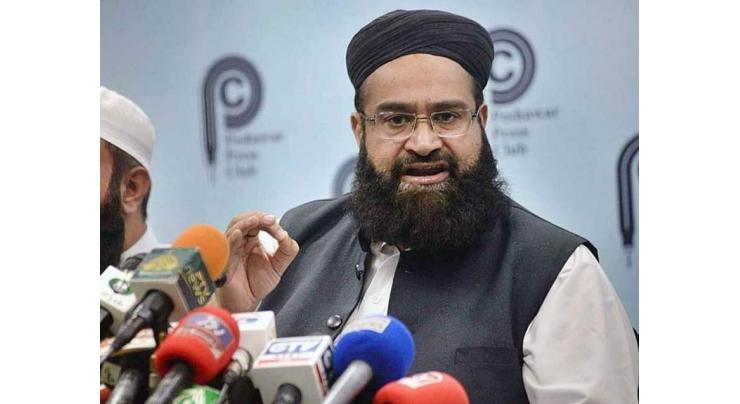
- Home
- Pakistan
- News
- Arab League Submit's declaration promises bright future for Muslim Ummah: Interfaith Harmony and Mi ..
Arab League Submit's Declaration Promises Bright Future For Muslim Ummah: Interfaith Harmony And Middle East Hafiz Muhammad Tahir Mahmood Ashrafi
Sumaira FH Published May 20, 2023 | 10:31 PM

Pakistan Ulema Council Chairman and Prime Minister's Special Representative on Interfaith Harmony and Middle East Hafiz Muhammad Tahir Mahmood Ashrafi, on Saturday highlighting the significance of the Arab League summit's declaration, said it promised a bright future for the Muslim Ummah
ISLAMABAD, (UrduPoint / Pakistan Point News - 20th May, 2023 ) :Pakistan Ulema Council Chairman and Prime Minister's Special Representative on Interfaith Harmony and middle East Hafiz Muhammad Tahir Mahmood Ashrafi, on Saturday highlighting the significance of the Arab League summit's declaration, said it promised a bright future for the Muslim Ummah.
Addressing a press conference, he said the declaration offered a promising outlook for the future of Muslims worldwide.
During the conference, Ashrafi addressed several pressing issues faced by the Muslim Ummah, particularly focusing on the challenges in Kashmir and Palestine. Notably, he emphasized Saudi Arabia's role as the head of the Organization of Islamic Cooperation and expressed hope that practical steps would be taken to address the Kashmir and Palestine issues promptly.
He raised concerns about India's plan to hold the G20 meeting in Indian illegally Occupied Jammu and Kashmir (IIOJK), which he attributed to China.
He called upon Turkey, Saudi Arabia, and other nations to refrain from participating in this perceived illegitimate act by India.
Furthermore, Ashrafi highlighted Pakistan's sovereignty, stressing that no country or its representatives should interfere in its internal affairs.
As the President of the International Interfaith Harmony Council, he conveyed Pakistan's commitment to maintaining independence in its internal matters.
He commended the Arab Summit's declaration as a permanent plan of action to promote unity among Arab Islamic countries.
He emphasized the importance of practical measures in ending external interference and sectarian violence, which would ultimately strengthen and stabilize the Muslim Ummah.
Ashrafi also acknowledged the Arab Summit's unwavering stance on the Palestine issue, considering it a representation of the plight faced by the oppressed Palestinians.
He expressed the hope that concrete steps would be taken soon to address the issues of Kashmir and Palestine.
Additionally, Ashrafi praised the leadership of Crown Prince Amir Muhammad bin Salman, under the patronage of King Salman bin Abdulaziz, in fostering peace and security in the region.
Responding to a question, he reiterated Pakistan's desire for improved relations with India, emphasizing that the restoration of these relations hinged on resolving the Kashmir dispute.
Acknowledging China's role in foiling the G20 meeting conspiracy in IIOJK, Ashrafi expressed gratitude towards the Chinese government and people.
He hoped that Saudi Arabia, Turkey, and other nations would refrain from participating in the meeting, citing India's violation of international laws by hosting the event in Occupied Kashmir.
When asked about recent developments in Saudi Arabia, Iran, and Syria, Ashrafi expressed the hope that the restoration of relations among these nations would pave the way for an end to sectarian violence within Arab-Islamic countries.
He further expressed optimism that the people of Syria would be able to return to their homeland, thus fostering peace in the region.
Turning his attention to Pakistan, Ashrafi condemned the brutality and violence that occurred on May 9, emphasizing that such acts were unacceptable under any circumstances. He called for the arrest of all criminals involved, emphasizing that unity among the Pakistani nation and its armed forces was essential for the stability of the country.
He categorically stated that interference in Pakistan's internal affairs by US senators, representatives, or any other foreign government was unacceptable.
In conclusion, Ashrafi addressed the statements made by Zalmay Khalilzad, shedding light on the conspiracies against Pakistan.
He questioned Khalilzad's silence on Indian and Israeli terrorism and human rights violations, suggesting a biased perspective.
Related Topics
Recent Stories

Selection committee dissolved over Pakistan women cricket team's poor performanc ..

Punjab CM Maryam Nawaz in police uniform at Chung police center

Currency Rate In Pakistan - Dollar, Euro, Pound, Riyal Rates On 25 April 2024

Today Gold Rate in Pakistan 25 April 2024

Mired in crisis, Boeing reports another loss

Session Awarding Ceremony 2024 held at Cadet College Muzaffarabad

Austrian ski great Hirscher to make comeback under Dutch flag

Pakistan, Japan agrees to convene 'Economic Policy Dialogue'

FM Dar conveys deepest sympathy on torrential rains devastation in UAE

Spain PM Sanchez says weighing resignation after wife's graft probe

Tennis: ATP/WTA Madrid Open results - 1st update

Long-lost Klimt portrait auctioned off for 30 mn euros
More Stories From Pakistan
-
Global tributes to kashmiri icon Amanullah Khan on 8th death anniversary
7 minutes ago -
Payment of 100 pc pension to widows of non PUGF employees of TMA demanded
26 minutes ago -
Wave of inflation not be reduced in Peshawar
26 minutes ago -
Renowned TV, stage actress, playwright, activist Madeeha Gohar remembered
36 minutes ago -
Delegation from CMCC, CMPak visit PTA
37 minutes ago -
Persian collection titled 'Gulang-e-Arzoo' on April 27
56 minutes ago
-
Nutrition Int'l donates high-tech food lab to IFA for enhanced quality control
56 minutes ago -
Meeting regarding drug use in educational institutions held at ANF Headquarters
1 hour ago -
Two-day Int'l mathematics conference to begin on April 26 at GCU
2 hours ago -
PFA disposes of 980 adulterated milk
2 hours ago -
President stresses joint efforts to control Malaria
2 hours ago -
APHC denounces arrest, harassment of IIOJK people by Indian forces
2 hours ago